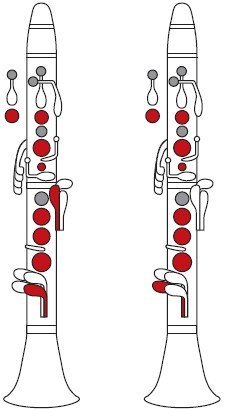Hey there, fellow clarinet enthusiasts! Let's get to the roots of something really interesting today—the historical significance of the F Minor Pentatonic scale on clarinet music. It's a mouthful, but it packs a punch that you won't want to miss.

Clarinet Fingering Charts are always FREE at MartinFreres.net!
If you've ever found yourself grooving to a jazz solo or a blues tune, chances are you've been dancing with the F Minor Pentatonic scale without even realizing it. This scale has been a cornerstone in various music genres for generations. It all started with traditional African music, and from there, it made its way into jazz, blues, rock, and even classical music, leaving an indelible mark on clarinet players throughout history.
The Composition of the F Minor Pentatonic Scale
The F Minor Pentatonic scale is beautifully simple, consisting of just five notes: F, Ab, Bb, C, and Eb. But don't let its simplicity fool you – this scale is incredibly expressive and versatile. The lack of semitones creates an open, airy sound that musicians love. For beginners, it might seem basic, but those five notes are a gateway to endless musical possibilities!
| Note | Interval |
|---|---|
| F | Root |
| Ab | Minor Third |
| Bb | Perfect Fourth |
| C | Perfect Fifth |
| Eb | Minor Seventh |
Historical Impact on Jazz and Blues
One of the most significant contributions of this scale came during the early 20th century when it heavily influenced jazz clarinetists like Benny Goodman. Known as the “King of Swing,” Goodman pioneered a genre that celebrated improvisation. He frequently used the F Minor Pentatonic scale in his solos, and his playful, free-spirited approach captivated audiences worldwide. It was as if he sprinkled a bit of magic every time he played it!
And let's not overlook the blues! Legendary musicians like B.B. King and Muddy Waters embraced the F Minor Pentatonic scale, further popularizing it and solidifying its place in the clarinet's rich history. This scale became the secret ingredient that allowed musicians to express deep emotions without the constraints of traditional Western classical harmony.
Playing Techniques and Expression
Exploring this scale is like sailing on open waters; the freedom it offers players is truly exhilarating! The F Minor Pentatonic opens up a world of improvisation, creativity, and expression. Whether you're working on a new piece or preparing for a performance, this scale is a reliable tool in your musical arsenal.
Let's talk about some techniques to master the F Minor Pentatonic and elevate your clarinet playing:
- Start slow: Practice the scale at a comfortable tempo to internalize the notes and fingerings.
- Explore different octaves: Try playing the scale across the entire range of your clarinet.
- Add embellishments: Once you're comfortable with the basic scale, experiment with trills, grace notes, and other ornaments.
- Play with rhythms: Try different rhythmic patterns to add interest and complexity to your practice.
Collaborating with Other Instruments
The F Minor Pentatonic really shines when you play with other musicians. Picture yourself in a jazz combo with a trumpeter, bassist, and drummer, all grooving together. As the clarinetist, you can weave your melodic lines using the F Minor Pentatonic, creating a musical conversation that speaks directly to the heart of your audience.
Teaching Applications
For music educators, the F Minor Pentatonic scale is a valuable teaching tool. It provides a bridge between classical and contemporary music, helping students understand the roots of their craft while offering a modern approach to learning the clarinet. Plus, it's enjoyable! Your students will love jamming with this lively scale.
Share Your Experiences
We'd love to hear your personal stories or experiences with this scale! How has the F Minor Pentatonic influenced your journey as a clarinetist? Maybe you had an eye-opening lesson or an improvisational moment that became a career highlight. Share your stories and inspire fellow musicians!
Conclusion
The F Minor Pentatonic scale has left an indelible mark on clarinet music. It's a thread that runs through various genres and eras, a musical language that goes beyond theory to evoke genuine emotions. As you continue your musical journey, embrace the beauty and versatility of this scale. Whether you're just starting out or you're a seasoned player, the F Minor Pentatonic scale will always be a reliable companion. Keep playing, keep exploring, and let those notes soar!
Table of Contents
- The Composition of the F Minor Pentatonic Scale
- Historical Impact on Jazz and Blues
- Playing Techniques and Expression
- Collaborating with Other Instruments
- Teaching Applications
- Share Your Experiences
- Conclusion








